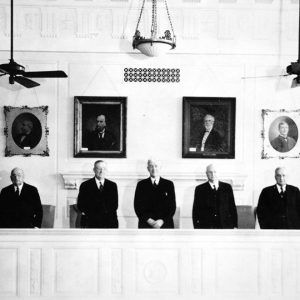calsfoundation@cals.org
Thomas Hadden Humphreys (1865–1951)
Thomas Hadden Humphreys, son of a Confederate army officer, spent some thirty-nine years on the judicial bench, the last twenty-six as a justice of the Arkansas Supreme Court, and held elective political offices for forty-four years without ever having had an opponent. Governor Jeff Davis, the populist orator who later became a U.S. senator, appointed Humphreys, a Fayetteville (Washington County) lawyer, to a new chancery judgeship in the Eleventh District in 1903, and Governor George Washington Hays named him to a vacancy on the Arkansas Supreme Court in 1916 when Justice William F. Kirby was elected to the U.S. Senate.
Humphreys’s father, John T. Humphreys, was a lawyer in Fort Smith (Sebastian County) who joined the First Arkansas Light Artillery at the outbreak of the Civil War in 1861 and later took command of the battery for several of its major engagements, such as the Battle of Chickamauga, but resigned his command after the siege of Chattanooga in the fall of 1863. His wife, Belle Aldridge Humphreys, left Fort Smith during the war and took refuge in Upshire County, Texas. Thomas H. Humphreys was born there, north of Longview, on September 20, 1865. The family returned to Fort Smith, where his father resumed his law practice. Humphreys went to Fort Smith schools and the University of Arkansas (UA) in Fayetteville but received his law training at the University of Tennessee. He joined his father’s law practice and became city attorney for Fort Smith.
He married Beulah C. Botefuhr of Fayetteville in 1890, and the couple moved to Fayetteville, where he opened a practice. He was elected to the Arkansas House of Representatives in 1898 and was speaker of the House for the 1901 session. When trial courts were split into chancery and circuit divisions in 1903, Governor Davis appointed him to the new chancery division in the Eleventh District. Humphreys helped plan the construction of a new Washington County Courthouse and conducted the first trials there. He ran for the position twice afterward, facing no opponent.
Justice Kirby ran for the U.S. Senate seat that was vacated with the death of Senator James P. Clarke in 1916, and when Kirby was elected, Governor Hays appointed Humphreys to finish his term on the court. Humphreys was reelected three times without an opponent. He retired rather than run again as his last term was ending in 1942.
Justice Humphreys, like a great majority of judges during his era on the court, applied constitutional, statutory, and common law in the conservative tradition. Given his family background—his father was a dedicated Confederate officer—Humphreys’s approach to the law in matters involving racial conflicts may deserve some reflection. He was freshly on the court when a cascade of cases arising out of the Elaine Massacre of 1919 reached the Supreme Court and, beyond it, to the U.S. Supreme Court. They all dealt with the murder convictions and death sentences of twelve Black men who were accused of involvement in an insurrection. Scores of Black people were slain by lawmen, vigilantes, and federal troops in an explosion of violence that officials said was necessary to put down the insurrection. The trials of the twelve Black men were summary affairs, and their hasty convictions were based on nonexistent or faulty evidence. Eventually, all twelve men went free, largely owing to a decision of the U.S. Supreme Court in Moore v. Dempsey, authored by Justice Oliver Wendell Holmes. The Arkansas court and its five justices had a mixed record on affirming the rights of the accused men. Although Humphreys went along with the majority on decisions that freed the men, he twice dissented on freeing several of the men on technical grounds.
Thomas and Beulah Humphreys had three sons. His wife died in 1926. Humphreys died on November 8, 1951, in Fayetteville, where he lived with one of his sons. He is buried in Evergreen Cemetery in Fayetteville.
Upon Humphreys’s death, Chief Justice Griffin Smith said his colleague’s forty-four-year political career without an opponent testified to his hold on the state’s affections. “Judge Humphreys was characteristically direct and penetrating in his presentation of legal views,” Smith said. “When propriety permitted, he spoke eloquently and with tremendous power in defense of public rectitude, and he was equally matchless in denunciation of evil.”
For additional information:
“T. H. Humphreys Dies; Formerly on High Court.” Northwest Arkansas Times, November 8, 1951, p. 1.
“T. H. Humphreys, Ex-High Court Justice, Dies.” Arkansas Gazette, November 9, 1951, p. 9B.
Ernest Dumas
Little Rock, Arkansas
 Early Twentieth Century, 1901 through 1940
Early Twentieth Century, 1901 through 1940 Law
Law Supreme Court of Arkansas, 1942
Supreme Court of Arkansas, 1942 



The Judge, as my family always referred to him, was my great-grandfather. He was my mother’s paternal grandfather.